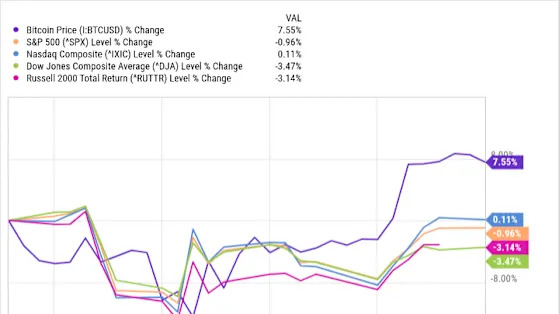Low-cost UK airline EasyJet saw its shares plunge on Thursday morning after the company reported widening losses but confirmed its targets for the financial year.
The airline’s headline loss before tax was £394 million (€467.3m) for the six months ending 31 March 2025, the first half of the company’s financial year ending in September 2025. This compares to £350m (€415.1m) for the previous year.
EasyJet also reported an 8% rise in its group revenue, to £3.53 billion (€4.2bn) from £3.27bn (€3.9bn) for the same period.
Seat capacity increased by 6%, and the number of passengers rose by 8%.
Strong winter bookings helped boost the results, but the timing of Easter made a negative impact of £50m (€59.3m). The income was also dragged down by increased investment and higher fuel costs.
Related
The company’s share price plunged in the morning trade in London by 6%, it made up some losses by 10 a.m. when the shares traded more than 3% cheaper than the previous day’s close.
EasyJet holidays, the company’s tour operator branch, delivered a £44m (€52.2m) profit, £13m (€15.4m) more compared to the same period in the previous year.
The travel operator branch Easyjet holiday, which accounts for more than one-tenth of the group’s revenue, has just teamed up with Tesco Clubcard, potentially reaching 23 million households. It is also expected to deliver a passenger growth of around 25% until the end of September 2025.
Promising outlook for the coming months
Concerning the group’s overall performance, “We saw a strong financial performance in April reflecting the shift in Easter this year,” the report said, underpinning the company’s expectations to be able to deliver its financial targets.
The airline aims to generate more than £1bn (€1.2bn) in annual profit in the medium term.
This is supported by increased bookings for the summer, with the third and fourth quarters already being 80% and 42% sold, respectively.
“We remain focused on delivering another record summer this year, expecting to drive strong earnings growth as we continue to progress towards our target of sustainably generating over £1 billion of annual profit before tax,” Kenton Jarvis, CEO of easyJet, said.
The company is adopting new planes that are more fuel efficient, lowering costs, while adding new destinations.
Richard Hunter, head of markets at Interactive Investor, said, “Despite having posted its usual and expected winter loss, easyJet has on closer inspection made the sort of progress which should ensure another year of growing profitability.”
As for the plunging share price, “the price has risen by 21% over the last year, as compared to a gain of 4.5% for the wider FTSE100,” Hunter said, adding that good numbers for April are supporting hopes for the group. “The market consensus of the shares as a buy [is] unlikely to waver despite any early turbulence in the share price reaction.”





